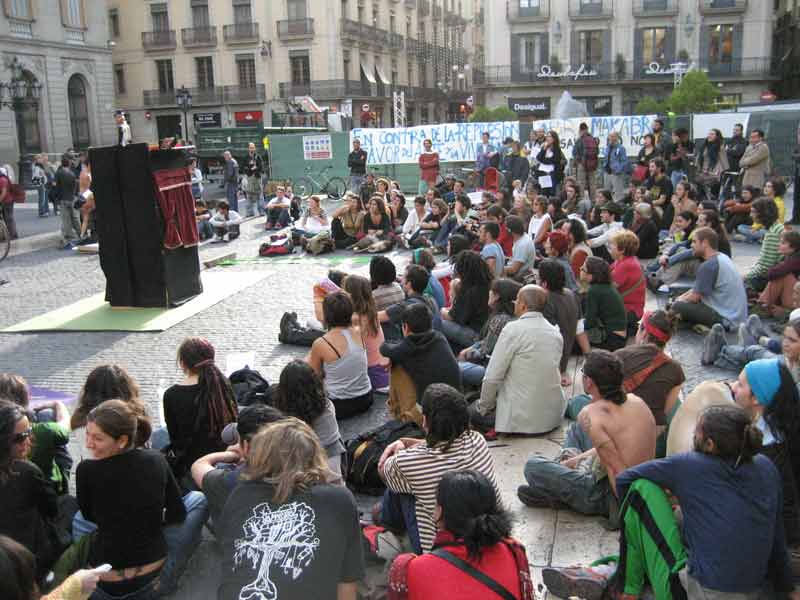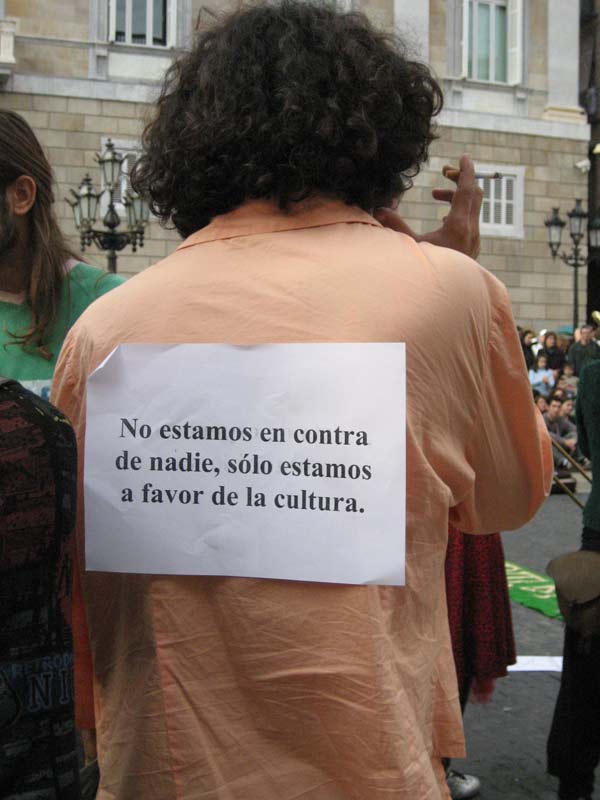Semester at Sea Fall
2006 Voyage 
TABLE
OF CONTENTS
- Home Page
- My bio
- Multisited Ethnography
Project: Realms of
Conflict Among Youth (Egypt, Turkey, Spain)
- Shipboard Interview
- Japanese Youth: To
Conform or Rebel?
- Vietnam: Youthful
Participation with Children
- Burma: Finding
Never-Neverland
- India: India's Poorest
Caste, the Dalits
- Egypt: A Wife Acquired, A
Dream Fulfilled
- Turkey: Escaping Near
Imprisonment
- Spain:
Witness to a
Protest in Barcelona
- Open Letter
 |
 |
 |
Witness to a Protest Outside
Barcelona's Capital Buildings
By
Ryan Harper
As we walked through the twisting and
contorted alleyways of the Gothic District in Barcelona we encountered
street performers of many different types. Under the massive Cathedral
towers overlooking the cityscape, we could hear the musicians playing
different sorts of handmade instruments and singing various types of
songs, which echoed in a beautifully accoustic manner between the tall
buildings. At one turn we began to hear something that was not of the
usual type of rhythmic pleasantry that we had been used to hearing and
we turned another corner into an open courtyard to see a gathering of
protestors outside the capital buildings. There were mostly young adults and the youth culture of Spanish culture, most of whom were dressed in "hippie" attire with dreaded hair, all gathered to attend an obnoxiously loud puppet show in
 the center of the courtyard. This was
followed by an equally loud brass orchestra ensemble led by an eccentric composer who vibrantly danced
about leading the tune. As we sat there and watched we noticed that
some police officers had gathered near the front of the capital
buildings dressed in riot gear.
the center of the courtyard. This was
followed by an equally loud brass orchestra ensemble led by an eccentric composer who vibrantly danced
about leading the tune. As we sat there and watched we noticed that
some police officers had gathered near the front of the capital
buildings dressed in riot gear. I asked the friend we were with that day, who has been studying in Barcelona for three months now, if this demonstration was the usual thing and if it ever turns violent. He replied by stating that the protestors were just gathering for the sake of it and that it never really results in any kind of violence. We were unable to talk with any of the protestors there that day about the reason for such an assembly but we did read a sign taped to the back one of the demonstrator's shirts which read "We are not against anything, we are only in favor of our culture."
At the spotting of this message I was reminded of an article written by Liliana Suarez-Navaz entitled "Rebordering the Mediterranean" in which the topic of citizenship is addressed within Spain as she states that:
"Spain
has experienced a major shift from an authoritarian political system
based on an imposed homogeneous 'principal of nationality' to a
democratic system based on a multicultural idea of a decentralized
Spanish state, in the context of a revival of nationalist regional
identities."
I regret not approaching any of the protestors in hope that they spoke English and could tell me more about the demonstration, but it certainly seems plausible that the message I read on the that man's back could certainly have some sort of connection with Suarez-Navaz's point regarding the apparently recent blending of the culture in Spain. Regardless of the intended message of the protest, we were happy to witness such a blatant example of democratic and political freedoms such as the right to publicly assemble and to express dissent and discontentment against the government. I was happily reminded of my home university in Eugene, the University of Oregon, because it is often the location of many political demonstrations and the like. For a democracy that has only been around for just over 50 years I was glad to see the people in Spain exercising the same freedoms that I do back home.